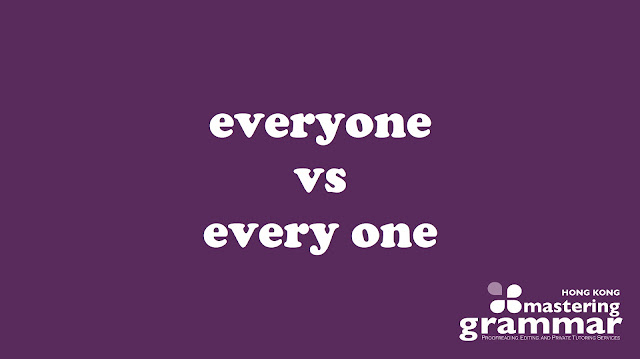Everyone or Every One: What Is the Difference?
Everyone (one word) is an indefinite pronoun used to refer to all the people in a group. It can be replaced by the word everybody:
✅ I'd like to thank everyone for being here today.
✅ I'd like to thank everybody for being here today.
❌ I'd like to thank every one for being here today.
✅ The comedian always manages to make everyone laugh.
✅ The comedian always manages to make everybody laugh.
❌ The comedian always manages to make every one laugh.
Unlike everyone, which always refers to people, every one (two words) can refer to either people or things. Specifically, every one refers to each person or thing in a particular group. It can be replaced by each one and is usually followed by an of-phrase to indicate who or what you are referring to:
✅ I'd like to thank every one of you for being here today.
✅ I'd like to thank each one of you for being here today.
❌ I'd like to thank everyone of you for being here today.
✅ The comedian always manages to make every one of us laugh.
✅ The comedian always manages to make each one of us laugh.
❌ The comedian always manages to make everyone of us laugh.
✅ Every one of those bananas is rotten.
✅ Each one of those bananas is rotten.
❌ Everyone of those bananas is rotten.
✅ Every one of the chairs is broken.
✅ Each one of the chairs is broken.
❌ Everyone of the chairs is broken.
I hope you have found this content helpful in your English learning journey. If so, please consider supporting this blog by buying me a coffee. Your contributions greatly help in maintaining the blog and are highly appreciated!
Examples from the Media
The economic future of New York depends on everyone coming back, not just the tourists. —The New York Times (2022)
We recognise not everyone can be a star. A flourishing society depends on everyone playing their different parts built on their different strengths and capacities. But we should still celebrate those in our midst who do well and who have such promise. Just as we should admire every one of us who contributes positively to our families and communities, so, too, should we all be proud of—and celebrate—our fellow citizens who lead the way and revel in excellence. —Otago Daily Times (2018)
Pop over to Church Street, Parramatta, and there's a choice of large, comfortable restaurants, every one of them entirely empty, since all the patrons insist on eating at tables placed on the street outside, preferably in a howling gale. —The Sydney Morning Herald (2022)
It is the right thing to do when the actions of every one of us impacts all of us. —Toronto Star (2020)
Every one of them is likely to buy a copy of the paper; their moment of fame. The mothers of every one of those players would almost certainly do the same, for the scrapbook. And their grandparents and friends. —The Age (2020)
Practice
1. The teacher gave everyone/every one of her students a present.
2. Everyone/Every one of my relatives has gone to Canada.
3. Everyone/Every one likes Mr Bean.
4. The pandemic has affected everyone/every one.
5. I have read each and everyone/every one of those books.
Answer Key
1. every one 2. Every one 3. Everyone 4. everyone 5. every one
Real-World Examples of Misuse
 |
| 1. Adding the definite article the before verbs helps to specify that the verbs to be used are the ones provided in the exercise. 2. Slither is the more accurate term for the movement of snakes. Slide, while not incorrect, is a broader term that does not convey the twisting and curving motion characteristic of snakes. 3. Everyone (one word) is an indefinite pronoun that refers to all people as a collective group, whereas every one (two words) refers to each individual person or thing when considered separately. Only the two-word form can be followed by an of-phrase. 4. The change from every year to each year helps avoid the repetition of every in close proximity, as Every one of us appears in the same sentence. Repetition can sometimes make a text less engaging or more monotonous to read. 5. Saying many people lose their lives to snake bites establishes a more direct and causative relationship between snake bites and the loss of lives. The conditional if suggests a possibility, which is unnecessary here since the sentence states a reason for the fear of snakes. 6. The correct expressions are long ago and a long time ago. It is grammatically incorrect to say long time ago without the indefinite article a. (Source: The True Light Middle School of Hong Kong (Primary Section)) |
 |
| (Source: An Instant Approach to English Grammar Practice for HKCEE and ASL Students) (Also by the Same Author: 1/2/3) |
 |
| (Source: Integrated English Practice for Junior Forms: Book 3) (Also by the Same Author: 1/2/3) |
 |
| 1. Using each blank instead of the blanks can enhance clarity and ensure that students understand they need to provide a connective for every blank space in the task. 2. Adding a colon enhances clarity and introduces a list format for the connectives. 3. Announced is a more precise and impactful verb choice. It conveys the action of making the news known publicly and loudly. 4. The verb make would probably not be the choice of a native speaker in this context. Ensure is one possibility. 5. The one-word form everyone is required. It refers to all the people in a group and can be replaced by everybody. 6. The verb following make should be a bare infinitive; that is, the base form of the verb. (Source: St. Joseph's Primary School) (Also by the Same School: 1/2/3/4/5/6/7) |


.jpg)







0 Comments